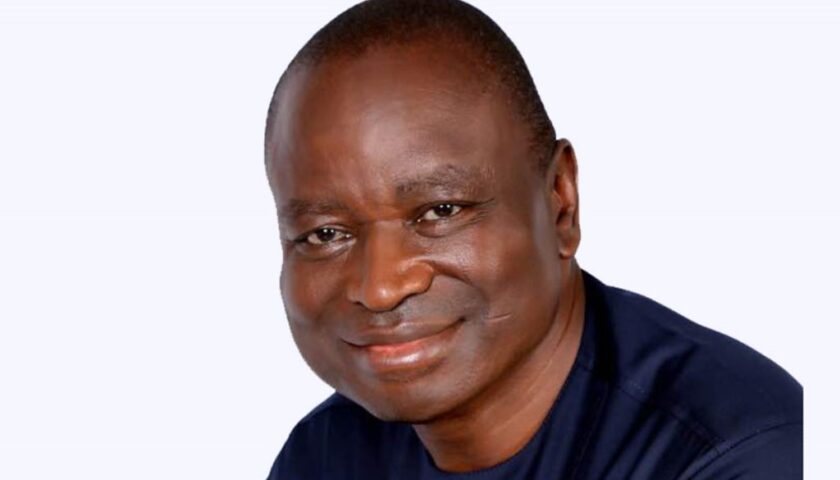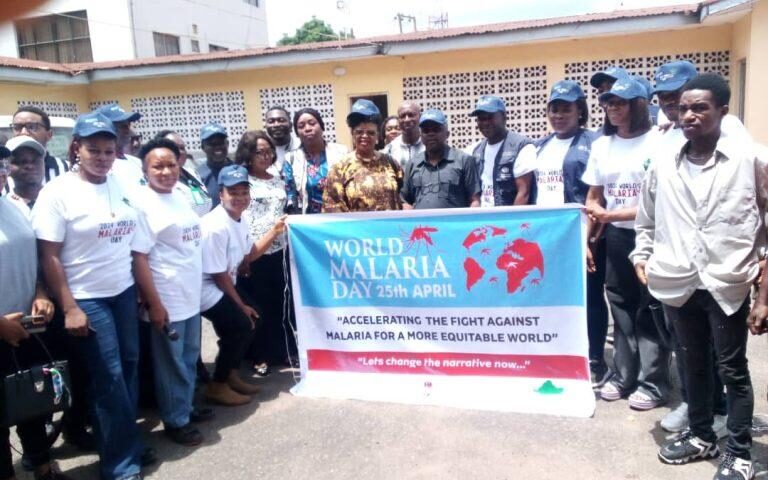Rev Fr. Jude Isiguzo is the Executive Director, Carmelite Prisoners’ Interests Organization (CAPIO), an organisation founded by some Irish Catholic priests who arrived in Nigeria in 1988. The then Catholic Bishop of Enugu Diocese, Bishop Michael Eneje of blessed memory asked the priests to be conducting mass service in prisons for the inmates. In this interview with Tony Adibe, Fr. Isiguzo disclosed the efforts CAPIO has been making to bring reformation and rehabilitation of the inmates, despite serious challenges. He also spoke about Gov Ifeanyi Ugwuanyi 2016 promise to install electronic devices from China to check crimes, especially Yahoo-Yahoo and kidnappings as well as consumption of hard drugs within the walls of the Enugu prisons, which up till now, he has not fulfilled. Excerpts:
May we know the objectives for founding CAPIO? And do you think the group is achieving its objectives?
The Carmelite Prisoners’ Interests Organization (CAPIO) was founded to redress the deplorable conditions of inmates and prisons in Nigeria. When the Irish Carmelites first arrived in Nigeria in 1988, the then Bishop of Enugu Diocese, Bishop Michael Eneja of the blessed memory, assigned the Carmelites the responsibility of celebrating mass inside the prison. And when they started visiting the prison facilities, they realized that the conditions of these inmates were terrible; it demanded more than just telling them that God loves them, and then preaching the gospel of our lord Jesus Christ and walking away.

Enugu State governor Ifeanyi Ugwuanyi promised and failed the leadership of Carmelite Prisoners’ Interests Organization (CAPIO)
So, they needed to do something positive. And that was how they started addressing some of the issues that confronted them. They met people who were in custody for over 18 years and above. And such people were not charged to court. People were just thrown into prison, and forgotten and the keys thrown away; People were dying in their numbers, sometimes on a daily basis from diseases like cholera – because of the poor sanitary condition; the sewages were broken, and they were overflowing here and there. So, it was a very terrible situation.
We started to tackle these issues and responded to them one after the other. And that was how these efforts were captured in the five programmes which CAPIO has today namely: legal department, medical department rehabilitation department, welfare department and advocacy department. All of those are ways we try to attain our overall goal which is encapsulated in the vision statement which says that “CAPIO is desiring to see a society in which unhindered access to justice and human rights and dignity of vulnerable people especially inmates are protected. But you know that these overarching goals are lofty ones; there wouldn’t be a time in a society where all of these goals are actualized but that is what continues to spur us on because when these things are met, then we have no reason to continue to exist; we have to close shop.
But the efforts we keep making daily through our mission statement to achieve this vision which we have for the inmates is to protect the interest of vulnerable people, especially inmates through advocacy for a reformed prison system, through legal services, rehabilitation, and reintegration into the society. In a nutshell, the objectives of CAPIO can be found in our name, which is Carmelite Prisoners’ Interest Organization (CAPIO). So, anything that is of interest to the inmates of prisons in Nigeria falls within the things CAPIO does.

Rev Fr. Jude Isiguzo, Executive Director, Carmelite Prisoners’ Interests Organization (CAPIO)
Now, to answer your question – whether we have achieved or achieving our goals, yes, to a very large extent. You can imagine all the efforts CAPIO has put into the issues concerning inmates and all that – other partners and other NGOs; if all of these things were not done, you can imagine the situation things would have been at the moment. So, we don’t want to rest on our oars; so, we continue to work and insist and demand reforms in the criminal justice system.
This is because the problem we are seeing in the prison is not a stand-alone problem. It is a problem that is compounded by a failure in the criminal justice system in Nigeria. Talk about the security system; the police, for instance, need reform. The ministry of justice both federal and state levels need reform. And then of course, the correctional services itself; So, all of these institutions play a role in the problems that we have in the criminal justice system in the country. And CAPIO will continue to advocate for reforms that will take us out of the woods because unless we reform these institutions continually – reform should be an ongoing thing or process; that is why the civilized countries are where they are; they don’t just say oh, we have arrived and then cross their legs and fold their arms. No matter how good a system is, they are always looking for how to improve on it, to do things better. Sadly, in our own situation, as bad as the systems are, we are just docile, doing nothing about them. We don’t even want to do anything to make the systems better. When you bring up reform issues, people are just targeting you to make sure that it doesn’t succeed because obviously, someone is benefiting from the bad systems as they are.
Again, the governments should have the political will to do what is right because all these institutions we are talking about are government institutions. There is systemic corruption in these institutions and unless the government has the political will to address these endemic corruption issues, we will still be going round and round; we will be in motion and make no movement. So, CAPIO is doing its own beats within the limited resources that we have and then within the mandate we have given to ourselves. But then a lot more need to be done. We will continue to strive until the living condition of inmates in Nigeria prisons become better; the treatment of inmates and then the reforms of these institutions I’ve talked about. Thanks.
How does CAPIO view the issue of alleged high-rate consumption of hard drugs by prison inmates?
I must say that these guys were very lucky to have spent only one month plus 17 days before the court discharged and acquitted them. There are a lot of people who faced trumped-up charges like that, and they spent over 10 years and even 15 years waiting trial. Anyway, that’s by the way. Going straight to the question you asked about hard drug abuse or substance abuse in the correctional facilities and how CAPIO views this. First of all, we must understand that the issue of drug trafficking in prisons or custodial centres across the world is a global problem; so, it’s not just a Nigerian issue. But then we are discussing our own local content and we have to approach it from the local situation here in our environment.
Yes, it is a global issue but looking at the measures other countries have used to curb the menace, you will see that those responsible in our own governments are doing absolutely nothing to make the situation better. In fact, it’s not even their headache at all.
So, it’s something worrisome in CAPIO for us and we’ve brought up this issue in some form: the issue of drug abuse and substance abuse among inmates. And the question has always been: how do you expect this to be curbed? For me, the inmates are not the problem. Most of the problems are from the prison staff. The inmates are confined. They don’t go out but there is the unwritten rule among the prison officers that if they do not get some of the things, they want to calm themselves down, they can become violent and ungovernable. So, the best thing is to allow them access to cigarettes, Indian hemp and anything that can make them high and feel good or make them forget their incarceration; so let them have it and then the officers will be able to keep them under control. But it is a very big business for the officers who smuggle these items into the facilities.

One Christmas morning we went to a Christmas celebration for inmates at the Enugu Maximum Custodial Centre, and some drama was playing out at the gate. It happened that one officer, a staff of the Nigerian Correctional Service, who is notorious for late coming was among the first to report to duty that morning. And he had in his possession supposed beverages – sachets of Milo, Peak Milk. He claimed that he brought them for some inmates. But out of curiosity, the officer at the gate wanted to probe more. And if you see how this thing was neatly packaged with the same gram mage, the same net weight that Milo or Peak Milk will have; but the officer at the gate probed further and realized that that was Indian hemp that was packaged in those small sachets. These were to be handed over to an inmate who will eventually sell them for that officer.
So, this was happening on Christmas Day. But I’m not saying that officers are the only route through which drugs are trafficked into the correctional centres, no. Some family members, some friends also conceal drugs and bring them into the facility. Some ladies might even conceal it in their private part and unless there is an intrusive search, you may never find it. And an intrusive search can only be done if there is reasonable suspicion for that.
But in other climes, some of them can be, in fact, more sophisticated. I have visited prisons in Romania. They had problems and drones were being used by people from outside to deliver drugs to inmates inside the prisons. In Island, there was an open place where people threw in drugs from outside of the gate. So, they had to make a very high net so that all the drugs thrown would hang on the net beyond the reach of the inmates. So, this is a global problem. But they are taking very scientific methods to curb it, by the use of sniffer drugs, drug detecting machines, body scanning machines to detect some of these things at the point of entry. But here in our society, we do absolutely nothing to curb the problem. So, it is a very serious issue that is impinging on the rehabilitative efforts or mandate the correctional facility is supposed to have on the inmates. Therefore, you cannot claim that you are rebuilding the life of someone who is taking hard drugs and destroying his life as well.
There is also the claim by the ex-inmates interviewed that the yahoo.yahoo business thrives among the inmates with some hitting big money such as N20m. They said this is done in connivance with prison officials. How does CAPIO feel about this?
Yes. It is very, very true that internet fraud is very high in prison. It is an open secret and among the inmates, they know those who engage in such business, and it is very, very lucrative for them. And because they are in a very secluded facility, people hardly suspect that any such thing can happen, or a crime can occur there. But I can actually refer you to a newspaper publication that unearthed a very high-profile fraudulent activity that was traced to the Enugu prison here. And that was published in the SUN Newspaper of April 18, 2016. And it was about a relative of the current Vice President of Nigeria, a cousin of his who was living in the US, who someone from the prison here in Enugu or some people from prison here duped of N8m and they were in the process of getting another N2m from her when she discovered and reported to the authorities. And then a special squad from the IGP’s office was sent to investigate the matter. And all the calls that were made to that lady in the US emanated from the Enugu prison here. So, this has been going on and we have been warning them even in churches during homilies to desist from such criminal acts.
I personally took this matter to the Governor of Enugu State, Chief Ifeanyi Ugwuanyi in 2019. I pleaded with him that there is a need to curb the high rate of fraudulent activities going on inside the Enugu prison. I think there was a time it was rumoured that his relative was also duped. So, I suggested to him that he can install network demobilisers inside the facility there. So that since there is a lot of phones, very high-profile phones and devices are smuggled into the facility; pre-registered sim cards are brought in and sold to inmates; so, since it doesn’t seem you can stop the trafficking of all those things, then render the use of all those things useless or invalid, and then they will stop it. So, equipment like that can make inmates stop using phones. Then you can also install landlines for them because one can argue that inmates have the right to use phones but certainly not for duping people or committing crimes. The officers on duty can also use the same to receive and make calls during working hours.
The response of the Governor was that he had placed orders for these devices from China. He said that he wanted the devices that are solar powered so that the issue of electricity or power failure wouldn’t be there. But then years have gone by without anyone seeing the devices even the one that is not solar-powered.
Therefore, if the government is serious about fighting crime, then proactive measures need to be taken. These things can be stopped. It is illegal for them to own phones and be using phones at will. There is a high rate of use among the inmates. And like I said, inmates don’t go in and out of Ogbette Main Market to purchase these phones. Someone brings in those phones and anything that is sold there costs a lot of money. It’s a flourishing business for those who are into it and that is why it is hard to stop and there are some of the staff who are conniving with the inmates to make sure that the proceeds from the organized crime gets to them and they live a wild and large lifestyle as a result.
We also hear of the indication that some of the high-profile kidnappings that happen in Enugu are coordinated from the inside of the Enugu prison by the hardened criminals with Android phones. Now the question is, has the correctional aspect of the so-called Correctional Centre been achieved with such a development?
Thing is that when something defeats the purpose for which it is made, that becomes useless. The purpose of prison was to reform people who were in conflict with the law and to treat crime. But when there is no meaningful treatment, no meaningful rehabilitation going on there, the place has turned opposite of what it should be. So, we have a crime university in our prisons; people who are petty thieves go into the prison; two, three years or more they come out as hardened and dangerous criminals. So that is the problem we are worried about, and we have been crying out for. There is a lot of idleness; how can you keep over 2000 able-bodied men over time and they are doing absolutely nothing every day. And then year in year out they are idle. Remember the scripture says that an idle mind is the devil’s workshop.

So, there is nothing impossible that you cannot find in our prison facilities: The inmates have access to sophisticated phones of their choice; so they use the phones to coordinate and execute crimes even outside the prison walls. There was a criminal gang that was smashed sometime ago and in the interview that they granted the police, they confessed that their gang was recruited while they were in prison. The fact that there is no meaningful rehabilitation programme that the prisoners are exposed to and made to undergo for treatment, is a very big danger to the society; they can only get worse. That’s the fact. It will take a very special grace of God for anybody to be there and not get involved in criminal activities going on there. Those who may not want to get involved will do so because they don’t know how to do it without being caught or detected. But then you remember that there are some who are willing to teach others. Therefore, kidnapping or organizing kidnappings from the prisons, is one of the least crimes inmates are committing while in prison. It’s very possible for them to do it from there.
We gathered that the hospital/health facility in the prison lacks vital Medicare as only paracetamol is administered on sick inmates, despite the type of illness. What does CAPIO think can be done to remedy the situation?
Yes. You can also look at the access to healthcare in Nigeria from the larger perspective; the sorry state in which our health facilities are, let alone the health facilities that are located inside the prison. It’s a very terrible situation that people can hardly access proper healthcare unless you have money. So, the experience of working for a very long time with the prisoners is that there: most of the time you have to treat yourself, pay for every service. In fact, even for you to be taken to some government hospitals where the inmates have a waiver for treatment, you have to pay for you to be transported to the hospital; if there are tests to be conducted, you also have to pay for them.
But the white man who constructed that prison thought it wise to have a clinic or OPS – what they call Out Patient Observatory or something like that; some places where the inmates are taken to be treated for minor illnesses while every other serious sickness is supposed to be taken out for proper serious investigation and treatment in government hospitals.
However, the truth is that the government has been paying lip-service to this because the Federal Government has the Exclusive List responsibility for the Custodial Centres across the country, and there are over 200 of them. So you can see how difficult it has been for the government to manage educational institutions like schools, medical facilities, let alone medical facilities in prisons. That’s why things are a sorry state in the prisons.
Granted that there is a reconstruction of medical facility at the Enugu Maximum prison as of the moment, but the supply of drugs has always been quite epileptic; and also considering the fact that the whole of the Enugu State Command of the Nigerian Custodial Centres, there is only one medical doctor. And this medical doctor is expected to treat all the inmates in Nsukka, Orji River, Ibite-Olo, and Enugu Custodial Centres. That’s about 3500 or 2800 inmates all together. And there is no budgetary provision for this medical doctor that is in charge of the state to visit those other facilities that are on the outskirts of Enugu. So, how can I attend to them? Even in Enugu here, the former medical officer that was in charge of the Enugu State Command before the current one, was busy doing his House-manship at the Nero-Psychiatric Hospital and so it was just CAPIO volunteer doctors and medical personnel who come on routen medical mission who attend to those inmates. And if they are not there, the inmates have to fend for themselves; they will have to provide for their drugs. I know there are nurses and pharmacists and other health workers and all that; if these personnel are there at all, the drugs are sold to the inmates. But the point I’m emphasizing is that there is hardly any drug supply at all.
But I think the major problem is that Nigeria hasn’t really decided to be efficient in the way we manage things. We concentrate a lot of responsibilities on people. For instance, in civilized societies, some of these professional duties are outsourced to companies or organizations that are able to do that. So, if the governments are serious, there has to be a hospital or medical body that will be charged with the responsibility of staffing the hospital or clinic at the prison. So, they run it in the normal way they run their clinics, and then it can be accessed by the staff and inmates. And then the money that was budgeted by the federal government will go to those health organizations that are managing the clinics.

Dilapidated nature of most prisons across Nigeria
The same with the feeding. The feeding money for the inmates is supposed to be outsourced to catering companies or organizations that should manage the catering facilities and then provide feeding for the inmates, and also the money budgeted for such is given to the catering company. The same is applicable to transportation of inmates to courts. Transport companies could bid and award the contract of conveying inmates in and out of court. All you need to do is to prepare a schedule indicating the different courts, the number of inmates and all that. Then all you need to do is to provide armed security men for such movement to and from the prison. It is not for the prison to be bothered about the security of the inmates they are supposed to be protecting, their treatment, feeding, treatment, and all manner of things the staff are saddled with. If Nigeria is serious about reforming the prison, there is a need for the government to copy what obtains in civilized societies and replicate such here. And society will be better for it. There is a lot to be desired in the way the prison is managed in Nigeria.





